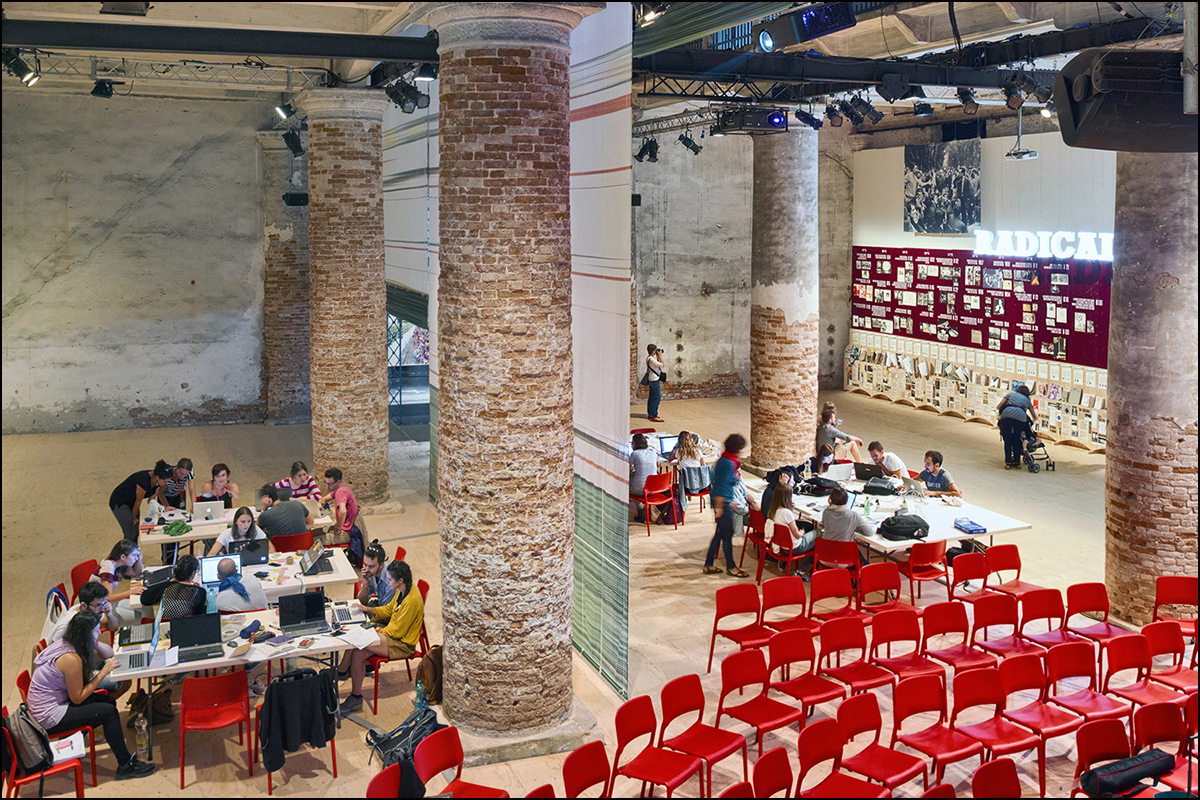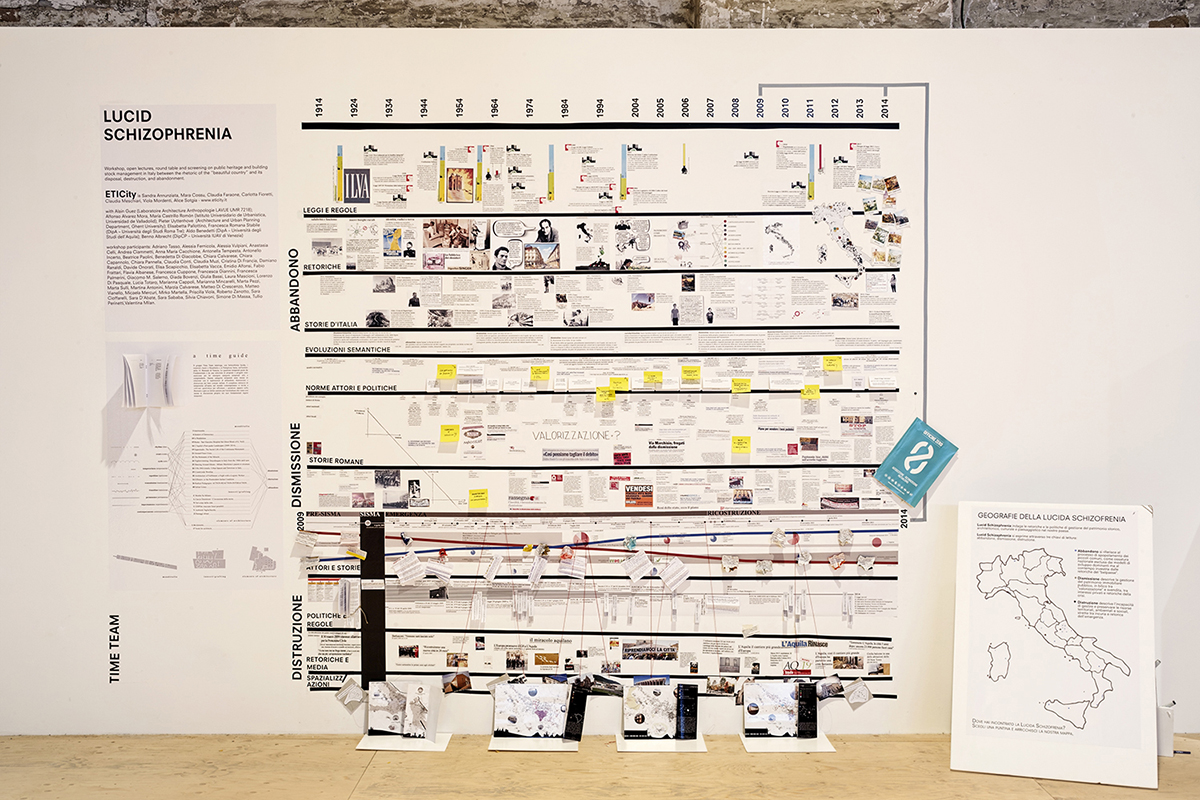collaborative urban design spatial planning creativity urban development Community ricerca knowledge tools and techniques digitalization premio tesi di laurea newsletter events Cohesion representation planning simulation local plans neighborhood climate change local development rural areas democrazia safety & security premio letteratura urbanistica strategic planning
LUCID SCHIZOPHRENIA
Public heritage and Building stock management in Italy between the Rhetoric of the "beautiful country"
and its Disposal, Destruction, and Abandonment
NEXT APPOINTMENT WITH LUCID SCHIZOPHRENIA IS NEXT 19TH OF DECEMBER. The Department of Architecture of Roma Tre University will host a seminar for discussing a selection of researches and projects presented at the Biennale.
Lucid Schizophrenia is the title of an educational public event that ETICity designed and performed within the Weekend Specials of Monditalia at the 14th International Architecture Exhibition of la Biennale di Venezia between the 16th and the 21st of September. This edition of Biennale had the peculiarity of tackling architecture from a more interdisciplinary perspective, and in particular Monditalia was aimed at giving an all-embracing portrait of Italy, recognising architecture as part of a wide cultural system. In doing so, the exhibition become a work-in-progress hosting weekly, through the Weekend Specials initiative, different kinds of happenings: from documentaries and performances to lectures, debates and workshops (a calendar of Weekend Specials is available here:
http://www.labiennale.org/en/architecture/exhibition/weekend-specials/
The event Lucid Schizophrenia focused on the management practices on public heritage and building stock in Italy, taking into proper account the present economic, social and cultural crisis and the so-called "austerity" policies. The recent debate in this respect seems to be crossed by two opposite waves producing a sort of schizophrenic attitude: on the one hand, a strong rhetorical discourse declaring the public heritage as a flagship of the country; on the other hand, the set or the lack of policies causing abandonment, disposal and destruction of public assets and building stock.
Lucid Schizophrenia project was shaped following the approach of ETICity association, seeking to develop critical research about cities and territories. In this frame, a workshop and an open event have been organized, including open lectures by international scholars. Within the "window on Europe", Alfonso Alvarez Mora and Maria Castrillo (Universidad de Valladolid) presented the uses and abuses of city centre and new developments in Spain as a form of capital accumulation and land exploitation. Pieter Uyttenhove (Ghent University) introduced the issue of post WWII reconstruction and War heritage recognition at the French Belgium border. Finally, the Parisian architect Alain Guez (Réseau LIEU/LAA/LAVUE 7218 UMR) brought the issue of temporality as an analytical tool to read the relationship within the built environment. 
Beside that, a final round table aimed at exploring alternative and experimental experiences in the field of building stock management such as that of Poveglia Association in Venice, Officine OZ from Rome and Appello per L'Aquila. These experiences were discussed by Paola Bonora, geographer, Roberta Carlini, journalist, Francesca Romana Stabile professor of heritage and preservation, Giovanni Caudo council member of the City of Rome.
Fifty students attended the workshop from three University of Architecture (Roma Tre University, University of L'Aquila and the IUAV of Venice). The students working at The Corderie dell'Arsenale were bodily part of the whole installation for a week. Supported by ETICity tutors, students worked in four groups each one tackling the common issue from a different perspective. The first focus was on disposal, as the selling of public buildings stock, landscapes and land with specific reference to Rome City. The second was destruction, as the failure of the duty of care and maintenance of public heritage and landscape in order to protect them from - or to repair them after - anthropic and natural hazards, with particular reference to L'Aquila after 2009 earthquake. Finally, a group studied abandonment as the lack of intervention to preserve architectural, historical, cultural and landscape heritage of the small municipalities which are the backbone of the country. A transversal group, called "Time team", tutored by Alain Guez realized a guide of the temporalities emerging from Monditalia Biennale exhibition read through the lens of the Lucid Schizophrenia.
The workshop results is a century long collective and shared critical reflection about a Lucid and Schizophrenic attitude toward collective resources. Its visible outcome has been a matrix that seeks to read both diachronically and synchronically the incoherence between norms, action and rhetoric in the field of building stock management in Italy. The matrix was set up on the Monditalia "Accumulator Wall", for the duration of the Biennale. 
Besides that, another immaterial result has been a network of stakeholders interested to keep on reflecting on the theme. Therefore, the event did not finished with the closure of Biennale, but ETICity is still working on it. Next appointment with Lucid Schizophrenia is next 19th of December, when the Department of Architecture of Roma Tre University will host a seminar for discussing a selection of researches and projects presented at the Biennale. All experiences were curated by people and groups differently connected to the Department of Architecture. The seminar aspires to be one of first public spaces in Rome to debate on the questions emerged from this edition of Venice Biennale.
ABOUT THE RESEARCH GROUP:
ETICity | Exploring Territories, Imagining the City (www.eticity.it) is an association founded by a group of independent researchers in urban studies and planning, with different academic and professional backgrounds, who experienced the need of having a common place to develop research projects at the service of cities and territories.
Starting from the exploration of the city, ETICity aim to be part in the process of knowledge building, producing active representations able to be premises of projects and innovations. Trusting in urban po-et(h)ics as a form of political praxis, ETICity looks at the city as a collective unfinished work; as the place of hidden potentials, where the change can happen.
ETICity approach to action-research is multi-disciplinary and mix-method, main activities deal with territorial analysis, mapping and itineraries of urban exploration, produced using quantitative and qualitative data, and including innovative approaches to observe, interpret and represent the multi-layered richness of urban contexts.
Furthermore, ETICity promotes educational activities (seminars, workshops, lectures) in the field of urban studies, encouraging inter-disciplinary exchanges in an international framework, supporting students in setting questions and elaborating contextual answers.
ETICity MEMBERS: Sandra Annunziata, Mara Cossu, Claudia Faraone, Carlotta Fioretti, Claudia Meschiari, Viola Mordenti, Alice Sotgia
SUPPORTED BY: Department of Architecture University of Roma Tre, Faculty of Civic Engineering, Architecture and Environment University of l'Aquila e in collaboration with University IUAV of Venice.
TUTORS/SPEAKERS: Aldo Benedetti (DICEA – Università degli Studi dell'Aquila); Alain Guez (Reseau Lieu LAA LAVUE UMR 7218); Alfonso Alvarez Mora, María Castrillo Romón (Istituto Universidario de Urbanística, Universidad de Valladolid); Elisabetta Pallottino, Francesca Romana Stabile (DipA – Università degli Studi Roma Tre); Pieter Uyttenhove (Architecture and Urban Planning Department, Ghent University)
ROUND TABLE: Paola Bonora (Università di Bologna), Moira Calamandrei (OZ-Officine Zero), Roberta Carlini (giornalista free-lance) Giovanni Caudo (Comune di Roma) Elisabetta Pallottino e Francesca Romana Stabile (Università di Roma Tre), Lorenzo Pesola (Associazione Poveglia – Poveglia per Tutti), Valentina Valleriani (Appello per L'Aquila)
PARTICIPANTS: Adriano Tasso, Alessia Fernicola, Alessia Vulpiani, Anastasia Celli, Andrea Ciammetti, Anna Maria Cacchione, Antonella Tempesta, Antonello Incerto, Beatrice Paolini, Benedetta Di Giacobbe, Chiara Calvarese, Chiara Capannolo, Chiara Pannella, Claudia Conti, Claudia Muzi, Cristina Di Francia, Damiano Ranaldi, Davide Onorati, Elisa Scapicchio, Elisabetta Vacca, Emidio Alfonsi, Fabio Frattari, Flavia Albanese, Francesca Cuppone, Francesca Giannini, Francesca Palmerini, Giacomo M. Salerno, Giada Bovenzi, Giulia Bassi, Laura Mascioni, Lorenzo Di Pasquale, Lucia Totaro, Marianna Cappoli, Marianna Mincarelli, Marta Pezzi, Marta Sulli, Martina Antonini, Marzia Calvarese, Matteo Di Crescenzo, Matteo Vianello, Micaela Mercuri, Mirko Martella, Priscilla Viola, Roberto Zanotto, Sara Cioffarelli, Sara D'Abate, Sara Sababa, Silvia Chiavoni, Simone Di Massa, Tullio Perinetti, Valentina Milan.
Related articles:
Download




Planum
The Journal of Urbanism
ISSN 1723-0993
owned by
Istituto Nazionale di Urbanistica
published by
Planum Association
ISSN 1723-0993 | Registered at Court of Rome 4/12/2001, num. 514/2001
Web site realized by ChannelWeb & Planum Association | Powered by BEdita 3





